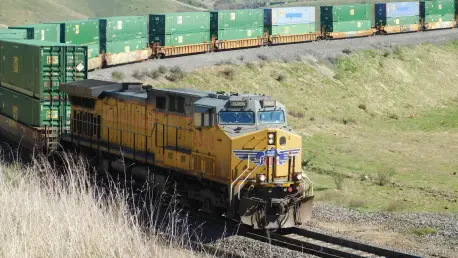The relentless pursuit of sustainability beckons the transportation industry toward a revolutionary pathway. The integration of rail freight represents a promising alternative that could redefine the UK’s supply chain dynamics. With intermodal rail services surging, the question emerges: could these steel tracks be the cornerstone of an eco-friendly logistical evolution?
Unlocking the Potential of Rail Freight in Environmental Strategy
The spike in container volumes is exerting pressure on the UK’s transportation framework, bringing environmental concerns to the forefront. Existing road infrastructure grapples with congestion, contributing to increasing carbon emissions and pollution levels. As government bodies and environmental advocates stress the necessity for greener solutions, the push toward rail freight emerges as a viable remedy.
Unveiling Rail’s Role in a Sustainable Future
Maritime Transport’s recent launch of new rail routes connecting DP World London Gateway with Hams Hall and iPort Doncaster marks a pivotal shift. These services, operational in conjunction with GB Railfreight from Monday to Saturday, present a strategic response to the soaring traffic at highly anticipated sites like London Gateway, where a colossal £1 billion expansion looms. By advocating a transition from road to rail transport, forward-looking investments aim to create an efficient, low-carbon supply chain.
Industry’s Commitment to Rail-Based Green Solutions
Key players in logistics express optimism about the environmental advantages of rail freight. John Bailey from Maritime Transport and Julie Garn from GB Railfreight highlight rail’s substantial reduction in carbon emissions when compared to traditional road transport. Their insights reflect a broader consensus within the industry, underscoring rail freight’s pivotal role in building an environmentally conscious supply chain.
Paving the Way for Practical Implementation
While rail freight poses a tantalizing vision, practical steps are required for a seamless transition. Strategic collaborations, infrastructure investments, and technological innovations are integral to fostering this shift. Expanding rail connectivity between major UK ports and strategic freight hubs underscores a critical move toward sustainable logistics solutions, transforming vision into actionable strategy.
A Pioneering Path Toward Sustainable Logistics
As the discourse around logistics evolves, rail freight has emerged as a formidable ally in the quest for sustainability. The integration of rail not only addresses capacity challenges but also establishes a robust framework for lowering emissions. Looking ahead, coordinated efforts across industry stakeholders can drive impactful change, redefining logistics for a sustainable future.









